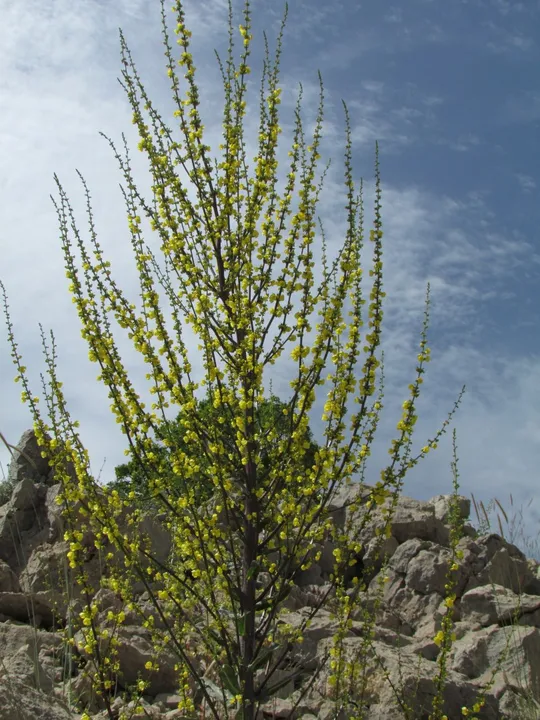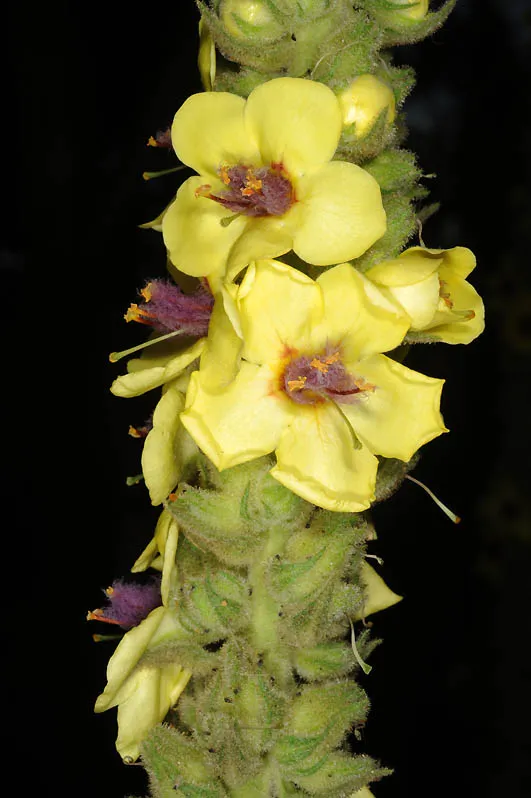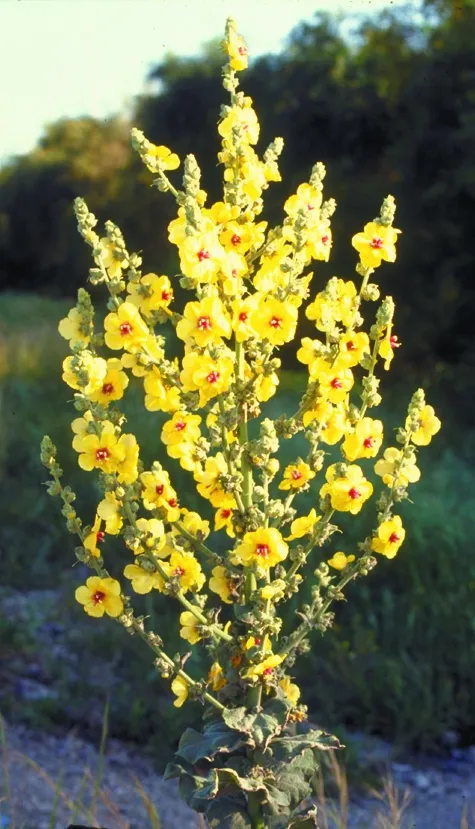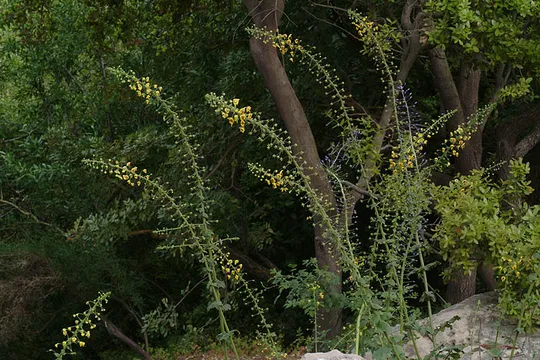Beirut Mullein
Verbascum berytheum
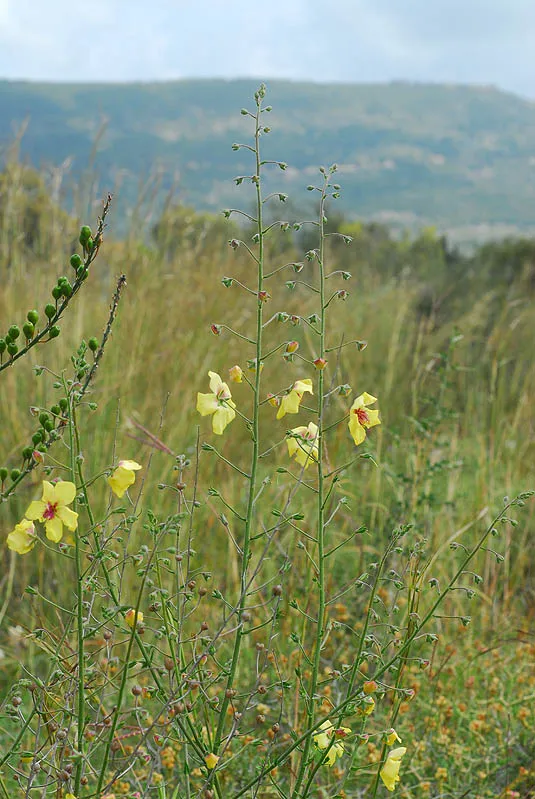
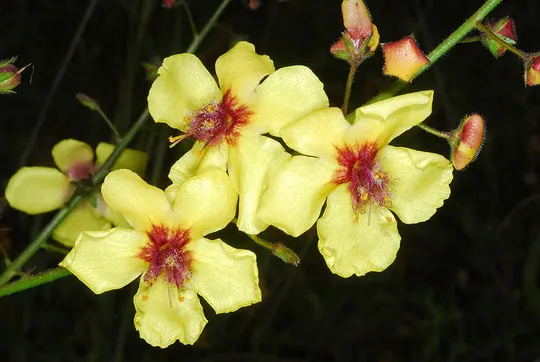
The distribution of Verbascum berytheumin Israel is limited to the Acre valley and the Sharon. In the Acre Valley – the Liman Nature Reserve north of Nahariya, where the largest population grows, and Tel Shaviv; in the Sharon –Pardes Hanna, Harutsim-North and the Bney Tsion Nature Reserve. In the Hebrew University Herbarium, there are also specimens from Herzliya and from Kfar Malal collected in the 1920s, but these sites apparently no longer exist. In the Flora Palaestina V. berytheumis also mentioned from the Carmel coast, but we did not find any signs of it.
The typical habitats are deep red hamra or dark hamra alluvial soils, relatively rich in clay.
The genus Verbascum has about 300 species, found mainly in the Mediterranean area and in the western Irano-Turanian area. The speciation center of the genus is the Anatolia plateau in Turkey, where some 160 species grow. Twenty-three species grow in Israel. Verbascum berytheum belongs to a group of Verbascum species in which each inflorescence in a leaf axil has a single flower. V. tiberiadisis is a vicarious species of V. berytheum that grows in the western part of the Mediterranean region and in the Mediterranean-desert ecotone. This may be a kind of "father species", which was the original source of V. berytheum when the climate became dryer in the Holocene and an arid environment developed on the coastal plain. Similar biogeographic examples are Iris atropurpurea, Onopordum carduiforme and Centaurea ascalonica.
• Verbascum berytheum populations that are not within a reserve (Pardes Hanna, Tel Shaviv south of Moshav Liman) will probably become extinct due to intensive development activity and habitat destruction.
• V. berytheum populations within reserves are very small and are exposed to genetic and demographic risks, as well as to random extinction.
• V. berytheum populations grow mostly in patches on areas of only a few meters, and the number of individuals in every patch ranges between a few plants to a few dozen. The populations are isolated from each other and very fragmented.
• No information is available on the nature of long-term trends regarding population sizes.
• The species is endemic to the coastal plain in Israel and in Lebanon up to Beirut. The threat in Israel is also a global threat.
• V. berytheum is protected in the Liman Nature Reserve in the Acre Valley and in the Bney Tsion Nature Reserve in the Sharon.
The main problem facing Verbascum berytheum in Israel is the protection of suitable habitats, particularly in places with deep clay hamra soil. The populations outside reserves, in Pardes Hanna and in north Harutsim should be protected. They should be monitored periodically due to the small size of the populations at all sites. In case of a decrease in the number of individuals, competition from aggressive shrubs should be prevented and new plantings considered. As the seed yield is high, and its germination in nursery conditions is fair, artificial reinforcement of existing populations by sowing or by planting is possible.
Verbascum berytheum grows only in Israel and in Lebanon. The species was first described from Beirut, hence its name.
Verbascum berytheum is a perennial species of Verbascum, limited in Israel to the coastal plain. The species is seriously endangered due to the small number of sites it is found in, fragmentation, the small number of individuals in the populations, as well as being limited to unique habitats of hamra and alluvial hamra clay. V. berytheum is a sub-endemic species that grows only on the coastal plain in Israel and Lebanon. The species grows in areas on which are suitable for urban development and construction, and is probably seriously endangered, having already become extinct in some.
פולק, ג. 1984. מבחר מיני צמחים אופייניים לחמרה וכורכר – בוצין בירותי. רתם 13: הצומח של חמרה וכורכר במישור החוף. 131–133.
Current Occupancy Map
| 1000 squre meter pixel | 5000 squre meter pixel | 10000 squre meter pixel | |
|---|---|---|---|
| number of observations | 0 | 0 | 0 |
| in total pixels | 0 | 0 | 0 |
| Family | Scrophulariaceae |
| Classification | On the endangered species list |
| Ecosystem | Coastal area |
| Chorotype | Eastern Mediterranean |
| Conservation Site | The Liman and Bney Tsion Nature Reserves |
| Rarity |
1
2
6
|
|---|---|
| Vulnerability |
0
4
4
|
| Attractiveness |
0
0
4
|
| Endemism |
0
3
4
|
| Red number |
1
5.3
10
|
| Peripherality | N |
| IUCN category | DD EW EX LC CR EN VU NT |
| Threat Definition according to the red book | Critically endangered |
 Based on:
Based on:
